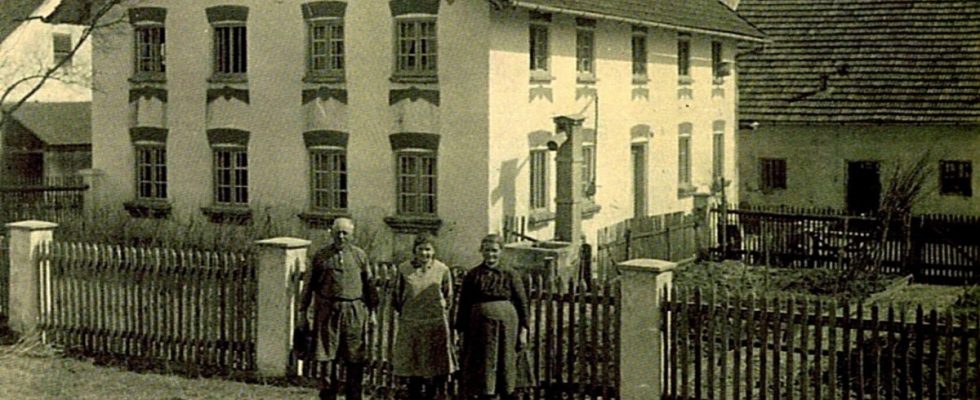On the morning of July 26, 1858, a local resident of Appercha, today the municipality of Fahrenzhausen, found a boy lying motionless in the grass in the garden of the “Altnerbauer”. When he gets closer to him, he finds that he is not drunk, as initially assumed, but was unconscious and apparently brutally beaten because of visible marks on his head. Although a doctor was called to take care of the injured man, the servant Joseph Felber from Jarzt died the next day from his severe head injuries. This is how the historical criminal case that local historian Ernst Keller researched in the Bavarian State Library begins.
The alleged perpetrator is quickly found. It is the 26-year-old servant Martin Huber from Kranzberg. In December of the same year he found himself before the jury in Munich for “the crime of intentional bodily harm followed by death”.
The Royal Public Prosecutor von Reichert succeeds in reconstructing the course of events. Accordingly, Huber and Felber were initially in the service of the “shoe builder” Andreas Schreiber zu Appercha. The two actually get along well, but Felber is bothered by Huber’s boastfulness. He never misses an opportunity to show off his “aptitude, strength and ability”. Felber decides to give his colleague a lesson. On July 11, 1858, on the way home from the inn, he started a fight with the hated informer. During the ensuing scuffle, he brute forcefully knocks Huber to the ground. The courageous intervention of a few lads prevented things from getting worse.
The employer, Andreas Schreiber, chases Felber from his farm. That’s not enough for Huber, whose pride has been hurt. He plans revenge. On July 25th the time had come. A servant employed as a replacement for Felber had found out that Felber wanted to go to Barbara Schreiber, a maid at the “Sedlmaierbauern”, that same night to do window cleaning. Huber had already laid down to sleep, but jumped out of bed as soon as he heard this news. With the words “That’s all right then,” he gets up and gets dressed.
Without warning, Huber hits with the club
Huber gets himself a 1.30 meter long and almost four centimeters thick spruce stick. Both farmhands set out “for a nocturnal walk”. In fact, at the “Sedlmaierbauern” they see a figure tampering with the maid’s window. It’s Joseph Felber. Swearing, Huber rushes over and strikes without warning. Felber falls to the ground as if struck by lightning. When he tries to get up, covered in blood, ten more blows follow. “Der Bayerischer Landbote” writes: “According to testimonies from witnesses, the blows to the head were of such force that the impact of the same could be heard even at a greater distance.”
Only now does the second servant realize the seriousness of the situation and pulls Huber away from his victim. Probably the last words of his life, which Felber brought out in a stammer, are: “So Martl, now I’ve raised my share, now it’s enough!” With the last of his strength he drags himself onto the village street and collapses unconscious in the garden of the “Altnerbauer”. The “corpse opening” ordered by the royal district court in Freising shows that the right temporal bone that was crushed in had penetrated the brain by about two centimetres. A significant bruise had formed inside the skull. “This blood kept pressing against the brain, causing inflammation and gangrene, so that death was the necessary and immediate result,” the coroner’s finding reads.
The verdict is relatively mild. The prosecutor and jury are unable to convince the court that the defendant could have foreseen the death of his opponent because of his violent beating. In view of his good reputation, the court found Huber guilty of “outrage and extreme brutality”, but only sentenced him to five years in a workhouse.
The postcard shows different views of Appercha.
(Photo: OH/Stadtarchiv Freising)
According to Keller’s listing, there were a number of other acts of violence in Appercha in the 19th century. In the night from September 16th to 17th, 1840, for example, a perpetrator, who is still unknown today, smashed the glass of the window to the bedroom of the “fence builder” Mathias. The couple was shot at, but they were not injured.
On Sunday, June 5, 1877, the only 16-year-old Josef Osterauer, who was already known to be “addicted to fighting and fighting”, marched cursing and noisily across the village street at 11 a.m. David Barth, son of the “Jodlbauer”, therefore confronted him. Josef Osterauer then rammed a knife into his abdomen without a word and without a word. Intestine and artery were punctured, causing Barth to bleed to death on the street. The 16-year-old was only sentenced to six years in prison by the circuit court because he was under 18.
On May 17, 1886, a dispute at the innkeeper in Appercha also ended fatally. During an evening of dancing, a boy stabbed another boy during an argument.

